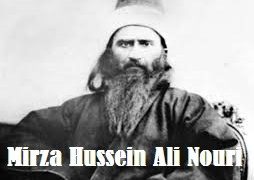During his lifetime, Hussein Ali Baha claimed for various positions. Merely three years after Seyyed Ali Muhammad Shirazi’s death, he claimed for his first one as the one whom God will manifest. This claim caused Babis to be chaotic. The first one who attacked him and cancelled his claim was Mirza Yahya Sobhi Azal, his brother.
In order to defend himself against the Azalis and proving these claims, Hussein Ali Baha wrote books and issued some commandments. His first claim was claiming for the one whom God will manifest. For many years, Bahaullah was of the followers of Babism and considered his brother Sobhi Azal as his successor. In the 4th year of his residing in Edreneh resort (1284 A.H.) he openly claimed for the very promised one whom Ali Muhammad gave good news about him. Additionally, Mirza Yahya must obey me.
The one whom God will manifest was first used by Seyyed Ali Muhammad Shirazi. In his book, the Bayan, he continually gave good news to his disciples concerning the emergence of a person who would be called “the one whom God will manifest”. In his book the Bayan, he writes: “The Bayan means nothing but towards the one who God will manifest[1]”. He writes, too: “The signs of truth emergence is a gift in each emergence by Allah for him in the next emergence… For instance, what has been sent by God for the Jesus has been a gift for Muhammad, the messenger of God by Allah; so what has been sent for the messenger of God by Allah observed by the faithful as the holy Quran was a gift by Allah towards Imam of the time (P.H.) and what is being created in the Bayan is a gift by Noqteh Bayan toward the one whom God will manifest who is the last emergence of Bayan…[۲]”
Concerning the emergence time of the one whom God will manifest, Seyyed Bab said: “The one whom God will manifest will be emergence between the years 1511 to 2007 after my emergence.[3]”
After Seyyed Ali Muhammad Shirazi’s death, many Babis claimed for the one whom God will manifest[4]. According to Sheikh Ahmad Rouhi and Agha Khan Kermani in the book Hasht Behesht [eight heavens]: “A person who was waking up every morning was claiming for it.[5]”
In the book “the highest Covenant”, Abul Qasem Afnan mentions the names of the claimants as: 1- Sheikh Ismaeel, 2- Seyyed Basir hendi, 3- Mirza Asadullah Khouee, 4- Mullah Sheikh Ali entitled Azeem, 5- Seyyed Alla, 6- Mirza Abdullah entitle Qouqa, 7- Mirza Hussein Qotb Neyrizi, 8- Hajji Mirza Mosa Qomi, 9- Hajji Mullah Hashem Kashi, 10- Hussein Milani, 11- Mullah Muhammad Nabil Zarandi and etc.[6] Meantime, Hussein Ali Nouri claimed for the promised one of the book Bayan and said: I am the very one whom God will manifest. This claim cause a riot among Babis[7]. The first one who attacked him and cancelled his claim was his brother Sobhi Azal.[8] However, it should be mentioned that Bahaullah didn’t possess the features of the one whom God will manifest and the promised one of the book Bayan because Seyyed Ali Muhammad Shirazi considers the emergence year as 15 to 20 centuries after himself; while Hussein Ali Baha emerged himself just 3 years after Seyyed Ali Muhammad’s death as the one whom God will manifest. Additionally, Seyyed Ali Muhammad Shirazi mentions the place of the emergence of dead body of the one whom God will manifest in the Sacred Mosque and writes in the book Bayan:
“و ان مسجد الحرام ما یولد من یظهره الله علیه ذلک ما ولدت علیه قل مقعد احمد ذکری یدخل فیه انتم هنالک لتصلون”[۹]
Nevertheless, Bahaullah didn’t emerge form Mecca contrary to Bab’s prediction and claimed for the one whom God will manifest[10] in Tehran prison[11].
[۱] The Persian Bayan
[۲] Ibid, p. 73.
[۳] Ibid, p. 61.
[۴] Nikou Philosophy, Vol. 4, p. 56, the Excellency Bahaullah, p. 103.
[۵] Refer to Hasht Behesht
[۶] The highest Covenant, pp. 478, 488, 479.
[۷] Baha’ism and Babism, p. 67.
[۸] Hussein Ali Nouri, Rahiq Makhtoum, Vol. 1, p. 196.
[۹] The Arabic Bayan, chapter 17, unit 4.
[۱۰] Manyazarullah: The one who, God will manifest.
[۱۱] Mojtaba Sabouri, the curriculum for deviant differences; Sheikism, Babism and Baha’ism, Qom: Sepehr-e-Hekmat, 1st edition, 1396, pp. 136-144.






